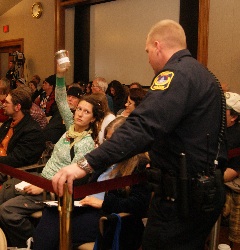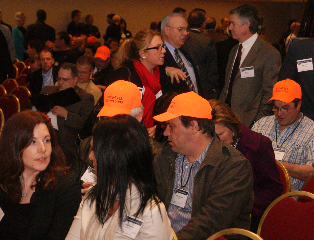Submitted by Harriet Rowan on
 Wisconsin Governor Scott Walker and Senate Majority Leader Scott Fitzgerald are pushing for radical changes in Wisconsin's current mining law to benefit a single out-of-state company.
Wisconsin Governor Scott Walker and Senate Majority Leader Scott Fitzgerald are pushing for radical changes in Wisconsin's current mining law to benefit a single out-of-state company.
Gogebic Taconite, based out of Florida, has proposed a massive twenty-one mile long iron-ore strip mine in some of the most beautiful and pristine land in the northern part of the state. Walker and the GOP are promoting the mining bill as the most important "jobs bill" of the session. Since Governor Walker's austerity budget kicked in on July 1, Wisconsin has lost jobs for six straight months, the worst record in the country.
The Assembly proposal (PDF) would make numerous changes to current law, including regarding how mines can affect waterways, wetlands and groundwater. The new bill drastically limits the time available to the Department of Natural Resources (DNR) for processing permit requests to 360 days. Similar permit requests in Minnesota took between two and four years. The new bill also places a two million dollar cap on the amount a company must reimburse the DNR for costs associated with processing a request. Any expense beyond the two million dollar cap would come from the DNR's budget. Similar mining permits elsewhere have cost between three and four million dollars, and the DNR already faces severe cuts.
Critics of the bill, including the majority of those testifying at public hearings, say the bill will allow mines that could damage water quality in a variety of ways. In addition, Democratic Rep. Brett Hulsey points out that if exemptions for dumping mining waste into floodplains are allowed, federal flood insurance for the state will be in jeopardy.
The Republican legislators are bypassing both process and practicality to get this bill passed before the end of session and before recall elections are scheduled for four Wisconsin senators and Governor Walker.
Gogebic Taconite Set the Stage
Gogebic Taconite, a mining company with offices in Hurley, Wisconsin and headquarters in Florida, has been paving the way for this legislation for a long time. Chris Cline, the president of The Cline Group, Gogebic Taconite's parent company, started donating to political campaigns in Wisconsin about a year ago. The Wisconsin Democracy Campaign noticed the campaign donations before the mining legislation was made public. Walker received $10,000 for his gubernatorial campaign, $8,000 directly from Cline and $2,000 from one of Cline's fellow mining executives.
Cline and his cohorts donated another $29,750, split between two Assembly candidates and one Senate candidate. Many suspect that Gogebic Taconite actually wrote the bill that is currently before the legislature.
Committee Disbanded
The mining bill was introduced by Assembly Republicans on December 8, 2011 and remained without an official author until late January, when the bill was already being debated on the floor of the assembly. Many had criticized the process, suggesting that no legislators were listed as authors of the bill because Gogebic Taconite was the true author. After fielding many questions about authorship, Jeff Fitzgerald, Assembly Majority Leader and brother of the Senate Majority Leader, suggested in a heated speech on the floor that all of the Assembly Republicans be added as co-authors. The bill passed the Assembly 59 to 36 on party lines, but faces an uncertain future in the Senate, where Republicans have a slim one-seat majority.
Before the Senate took up its own bill, in an unprecedented move, Senate Majority Leader Fitzgerald abruptly disbanded the Senate's Special Committee on Mining and gave the issue to the GOP-heavy Joint Finance Committee. This move drew criticism particularly from Senators Bob Jauch (D-Poplar) and Dale Schultz (R-Richland Center), who have said they would not support the assembly version of the mining bill, but do support mining and less drastic changes to the permitting process.
Scott Walker Asks WMC to "Sing Louder"
Walker has touted the current version of the bill as critical to moving Wisconsin forward by creating jobs. At the yearly conference of Wisconsin Manufacturer's and Commerce (WMC), the primary business association in the state, he addressed the crowd of over 300 guests for nearly an hour. His take away point was the importance of quick passage of the bill. He admitted he was preaching to the choir, but he pleaded for their help: "I need you to help us sing, I need you to help us sing loud, louder than we've ever sung before."
 Economic analysis conducted by Gogebic Taconite itself indicated their proposed project would create 700 mining jobs. Some critics have countered that the environmental impact could seriously harm Wisconsin's tourism industry.
Economic analysis conducted by Gogebic Taconite itself indicated their proposed project would create 700 mining jobs. Some critics have countered that the environmental impact could seriously harm Wisconsin's tourism industry.
As attendees were entering the auditorium, they were offered neon orange hats that said, "Vote Yes √ Mining Jobs." Immediately after the governor's speech, the President of WMC, Kurt Bauer, encouraged attendees to walk the few blocks to the capitol to ask their senators to support the mining bill. Shuttles were also provided.
Club For Growth Chimes in on Behalf of the GOP
After Senator Fitzgerald disbanded the special Senate Committee on Mining, an odd thing happened. The conservative political action committee Club for Growth leapt into action, making robo-calls in targeted districts. They targeted constituents of Democratic Senator Jauch, moderate Republican Senator Schultz and three other Republican Senators who had shown resistance to the Assembly version of the bill. The calls began to come in as early as 30 minutes after Fitzgerald announced the disbanding of the committee.
A press release from Senator Jauch slammed the robo-calls as "nauseating escalation of misleading political advertisements that jeopardize our democratic process." "Every indication points to coordination between this special interest Political Action Committee and the Majority Leader's office," said Jauch. When asked about why Club for Growth got involved, Jauch said, "I don't know who funds them, but I guarantee to you no one who contributed lives in Northern Wisconsin. They don't care about the people who live in Northern Wisconsin."
Club for Growth is a "heavy hitter" political action committee, according to Open Secrets. It is fueled by investment, banking and hedge funds interests who spent over $8 million in the 2010 election cycle on behalf of conservative Republicans. The Club turned heads in February of 2011 after running radio ads in support of Walker's collective bargaining bill even before it was sent to the legislators. Shortly after the bill was announced, it ran television ads saying that public workers hadn't "paid their fair share." R.J. Johnson, a key advisor to Wisconsin's chapter of Club for Growth, also served as a political strategist for Walker in 2010.
Alternative Mining Bill Proposed
Senators Jauch and Schultz presented an alternative mining bill on February 22, despite the dissolution of the special Senate Committee on Mining. They claim the bill balances the stated goals of the Republican majority and the concerns of citizens and does not pander to any specific company or project. Their timeline for the DNR to process a permit request allows for more time and provides options to extend the timeline if problems arise. The alternate bill will be presented to the members of the Joint Finance Committee, but the authors expect it to be "picked apart."

Comments
James Richard Bailey replied on Permalink
mining in Wisconsin
Anonymous replied on Permalink
Proceed with caution